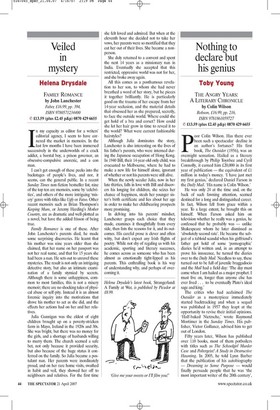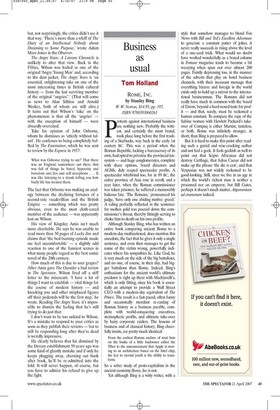Nothing to declare but his genius
Toby Young
THE ANGRY YEARS: A LITERARY CHRONICLE by Colin Wilson Robson, £16.99, pp. 216, ISBN 9781861059727 ✆ £13.59 (plus £2.45 p&p) 0870 429 6655 Poor Colin Wilson. Has there ever been such a spectacular decline in an author’s fortunes? His first book, The Outsider (1956), was an overnight sensation. Hailed as a literary breakthrough by Philip Toynbee and Cyril Connolly, it earned him £20,000 in its first year of publication — the equivalent of £1 million in today’s money. ‘I have just met my first genius,’ declared Daniel Farson in the Daily Mail. ‘His name is Colin Wilson.’ He was only 24 at the time and, on the back of such fawning attention, seemed destined for a long and distinguished career. In fact, Wilson fell from grace within a year. To a large extent, he brought this on himself. When Farson asked him on television whether he really was a genius, he confessed that he probably was — unlike Shakespeare whom he later dismissed as ‘absolutely second rate’. He became the subject of a tabloid scandal when his girlfriend’s father got hold of some ‘pornographic’ diaries he’d written and, in an attempt to prove his innocence, he turned the diaries over to the Daily Mail. Needless to say, these turned out to be full of juvenile braggadocio and the Mail had a field day: ‘The day must come when I am hailed as a major prophet. I must live on, longer than anyone else has ever lived . . . to be eventually Plato’s ideal sage and king.’ The critics who had acclaimed The Outsider as a masterpiece immediately started backtracking and when a sequel was published in 1957 they leapt at the opportunity to revise their initial opinions. ‘Half-baked Nietzsche,’ wrote Raymond Mortimer in the Sunday Times. His publisher, Victor Gollancz, advised him to get out of London.
Fifty years later, Wilson has published over 110 books, most of them potboilers with titles such as The Schoolgirl Murder Case and Poltergeist! A Study in Destructive Haunting. In 2005, he told Lynn Barber that the publication of his autobiography — Dreaming to Some Purpose — would finally persuade people that he was ‘the most important writer of the 20th century’, but, not surprisingly, the critics didn’t see it that way. ‘There’s more than a whiff of The Diary of an Intellectual Nobody about Dreaming to Some Purpose,’ wrote Adam Mars-Jones in the Observer.
The Angry Years: A Literary Chronicle is unlikely to alter that view. Back in the Fifties, Wilson was hailed as one of the original ‘Angry Young Men’ and, according to the dust jacket, The Angry Years is ‘an essential, enlightening take on one of the most interesting times in British cultural history — from the last surviving member of the original “angries”.’ (That will come as news to Alan Sillitoe and Arnold Wesker, both of whom are still alive.) It turns out that Wilson’s ‘take’ on the phenomenon is that all the ‘angries’ with the exception of himself — were absurdly overrated.
Take his opinion of John Osborne, whom he dismisses as ‘utterly without talent’. He confesses to being completely baffled by The Entertainer, which he was sent to review by the Express in 1957:
What was Osborne trying to say? That there was an England somewhere out there that was full of things he hated: hypocrisy and boredom and lies and self-deceptions . . . It was like listening to a drunk telling you how badly life has treated them.
The fact that Osborne was making an analogy between the declining fortunes of a second-rate vaudevillian and the British Empire — something which was pretty obvious, even to the most cloth-eared member of the audience — was apparently lost on Wilson.
His view of Kingsley Amis isn’t much more charitable. He says he was unable to read more than 50 pages of Lucky Jim and claims that ‘the bed-burning episode made me feel uncomfortable’ — a slightly odd reaction to one of the funniest scenes in what many people regard as the best comic novel of the 20th century.
How much of this is due to sour grapes? After Amis gave The Outsider a bad review in The Spectator, Wilson fired off a stiff letter to the miscreant. ‘I have a lot of things I want to establish — vital things for the course of modern history — and knocking you and other misplaced figures off their pedestals will be the first step,’ he wrote. Reading The Angry Years, it’s impossible to dismiss the feeling that he’s still trying to do just that.
I don’t want to be too unkind to Wilson. It’s a mistake to respond to your critics as soon as they publish their reviews — but to still be responding long after they’re dead is weirdly impressive.
He clearly believes that his dismissal by the literary establishment 50 years ago was some kind of ghastly mistake and if only he keeps plugging away, churning out book after book, he’ll be re-admitted into the fold. It will never happen, of course, but you have to admire his refusal to give up the fight.



















































































 Previous page
Previous page